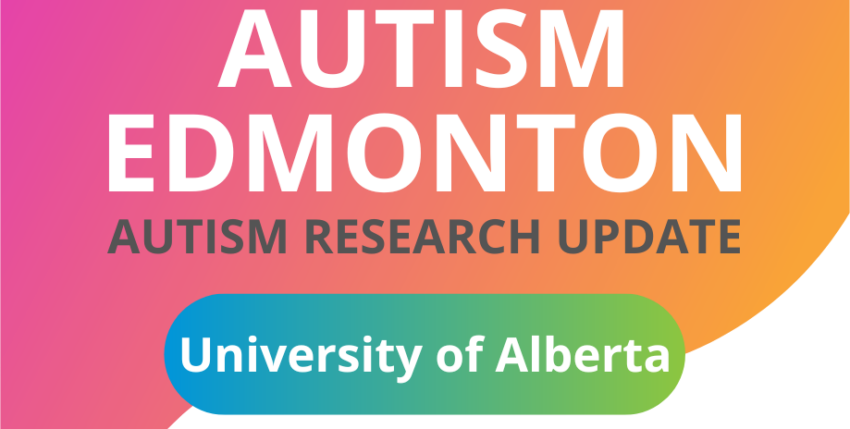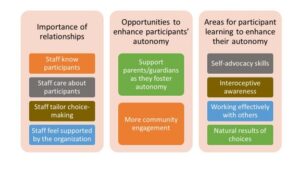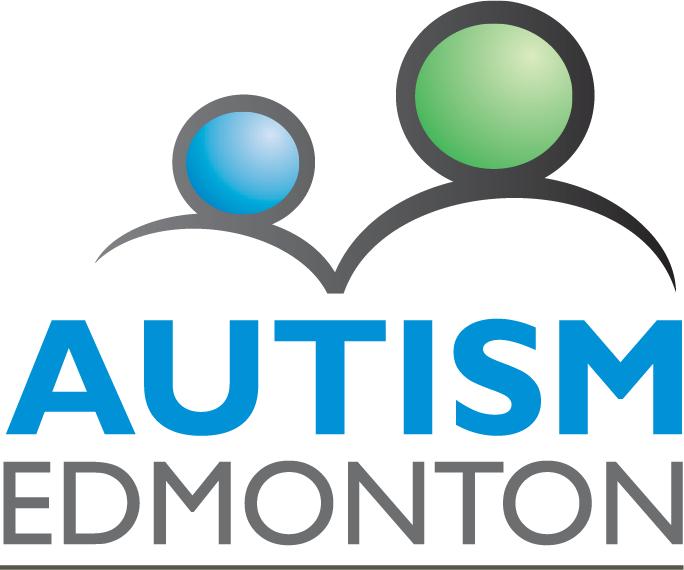
Jackie Ryan (she/her/hers)
Jackie is an Autistic PhD candidate in Rehabilitation Science at the University of Alberta. She holds a master’s degree in Leadership from Royal Roads University, where her research on leadership to promote the self-determination of Autistic individuals won the University Founders’ Award. Her doctoral research is on understanding self-determination and autonomy from the perspective of Autistic adults with intellectual disabilities using a community-based participatory research approach. Included in her research is the preparation of Research 101 open-access training to build the capacity for Autistic people to collaborate or partner in research. Jackie is part of the Neurodiversity Movement and seeks to empower Autistic people to thrive.
Research: Supporting Autonomy for Autistic Adults with Intellectual Disabilities in Edmonton
By: Jackie Ryan, Anne Borden, & Sandy Thompson-Hodgetts
I was fortunate to receive an Autism Edmonton and Autism Research Centre Graduate Student Grant for my doctoral research, under the supervision of Dr. Sandy Thompson-Hodgetts, entitled “Understanding autonomy and choice from the perspective of autistic people with intellectual disabilities: Community based participatory research (CBPR) to enhance self-determination.” We conducted this study in partnership with the Centre for Autism Services Alberta’s (CFASA) Quest for Independence program (Quest). It studied program participants’ views on their autonomy (reported separately), staff perspectives on their role related to participant autonomy, and the tools they felt they needed to provide the best service to the participants.
The community-based participatory approach to our research, which the grant supported, served to ensure the research was meaningful to Autistic people and written/presented in a way that is accessible in the community. The Autistic Community Partners (ACP) team consisted of five Autistic people: Adam Kedmy, Christina Devlin, Anne Borden, and Austin Lee, and one Autistic academic: Dr Heather Brown. This team, who was fairly compensated, has been involved in all stages of this research, including study design; data collection, analysis, and interpretation; and dissemination of results. The grant was instrumental in compensating the ACP team for their valuable time contributing to the project.
Why did we study autonomy for Autistic adults with intellectual disabilities?
Autonomy—being able to have the choices to lead a life that reflects one’s needs and desires–is one of three basic psychological needs that must be satisfied to be self-determined and thrive. The other two needs are competence and relatedness; both are enhanced when the need to be autonomous is met.
Autonomy is just as important to Autistic and intellectually disabled people as it is to anyone else, yet unfortunately, very little research on self-determination has included their perspectives. This project contributes to an emerging and much-needed body of inclusive work that can inform new approaches in autism services.
How did we do the study?
The study focused on Quest, an Edmonton-based program for emerging adults aged 18-29, focusing on the transition to adulthood, including life skills and living independently as part of the community. The study included the perspectives of two groups: (1) Quest staff about how they currently support Quest participants to be autonomous and what skills and abilities they think are needed to increase autonomy, and (2) Quest program participants about how they want to be supported to promote autonomy. We report on our findings from staff here.
Nine Quest staff (82% of all Quest staff) participated in a focus group or interview. We wanted staff to feel comfortable being honest, so used an external facilitator to maintain the confidentiality of the raw data because CFASA employs me as a member of the Executive team. Quest staff completed a questionnaire on work engagement. We found that Quest staff are more engaged than many of their peers, across all three areas: vigour, dedication, and absorption. This could be one of the reasons for our high participation rate.
We conducted a focus group with six Quest staff along with two interviews, one with two Quest staff and one with a single Quest staff member. The focus group transcript was anonymized, and the interview transcripts were merged and anonymized before being sent to
What did we learn?
The study uncovered three key themes from staff related to autonomy and autonomy-support: (1) the importance of relationships, (2) opportunities to enhance Quest participants’ autonomy, and (3) areas for Quest participants learning to enhance their autonomy.

We learned that staff believe that knowing the participants well, including knowing their interests and preferences and being able to interpret their behaviour, is crucial to supporting their autonomy. They care about the participants and feel the Quest program is a safe space for participants to test their autonomy. Staff tailor the choice-making opportunities to each Quest participant. They also feel supported by the organization to follow the Quest participants’ interests and feel they can try new things, make mistakes and learn from them. However, they recognize that low wages in this sector mean high staff turnover, resulting in a loss of knowledge and understanding about the Quest participants.
Staff also feel they are well situated to support Quest participants’ parents/guardians as they foster autonomy and navigate the transition to adulthood. This transition takes time, and each Quest participant has their own pathway. Staff would like there to be more community engagement with Quest participants to increase learning opportunities in the community, reduce stigma, and attain employment.
Staff also discussed skills that they believed would help Quest participants be more autonomous. These included developing interoceptive awareness, which is identifying internal feelings within one’s body, such as hunger, the need to urinate, and feelings such as anger and embarrassment. This increased awareness would assist Quest participants as they learn self-advocacy skills to effectively make their preferences, needs, and choices known to others. Also, because the Quest program takes place in groups, staff felt that participants would benefit from learning to make group choices and support each other. Lastly, staff believe that Quest participants’ autonomy would be enhanced if they learned to identify the potential consequences of their choices, to help them make informed choices. For example, learning they will feel tired the next day if they stay up all night playing video games. This awareness would help people make choices based on intrinsic rather than extrinsic (outer) motivators, such as an authority figure telling them they will get in trouble if they stay late. Making informed choices—whether it’s the best choice or not—is a helpful component of autonomy.
How can these findings help Autistic people?
While we conducted this study within one service provider, many of our learnings could be generalized to other service providers who want to support autonomy for Autistic people. The more service providers can learn about participant perspectives and staff best practices, the more they can adopt a framework that centres around autonomy. The work can also inform policymakers seeking to ensure that public programs best meet the needs of Autistic participants and their families, as they build independence skills in an atmosphere that encourages and respects their autonomy.
